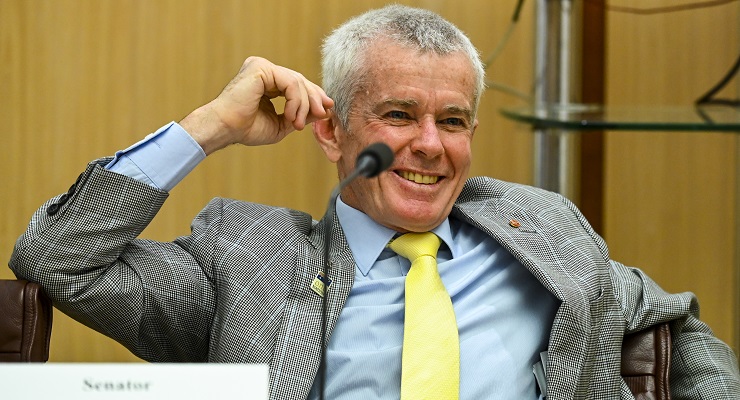
One Nation Senator Malcolm Roberts was clearly happy with his performance at Senate estimates last week — he was able to question various public servants on some of his favourite topics as part of his role on the Senate environment and communication legislation committee.
In one hearing, he grilled the Bureau of Meteorology (BOM) about its long-standing practice of changing its weather data to correct artifacts. Roberts has repeatedly questioned this activity, claiming the quite normal practice is proof of an agenda to promote climate change. The BOM stands by the practice which is subject to peer review and done by weather authorities around the world.
After asking extremely specific questions about some data, Roberts took the opportunity to grandstand: “Is the Australian temperature register anything the BOM says it is?” he asked.
He didn’t get an answer immediately; the BOM representative dryly said the senator’s question about whether they’re frauds would be taken on notice. But Roberts was happy enough with how the questioning went that he posted a clip of it to Facebook, along with 13 other clips from estimates that week.
What Roberts’ behaviour shows is that Senate estimates is becoming the political equivalent of an Instagram hotspot: places people go to make content. But they are meant to be a way of ensuring accountability for government departments and authorities.
Twice each year, ministers and public servants front up to Senate committees for an examination of budgeted expenditure and almost any other matter that comes to mind of the presiding senators. They are traditionally staid affairs. For two weeks there are hours upon hours of questions that drill into the minutiae of governing that are answered by people who generally want to say as little as possible.
In the digital age, there’s an additional purpose that is increasingly important: creating political content to distribute.
This aim has always existed to some extent. Answers to questions from estimates have provided important or juicy morsels that are written up. Sometimes a particularly heated moment or bombshell will happen and a clip of these fireworks will make its way into a television bulletin or on to a front page.
But this has become more important during the time of social media feeds. Every politician has their own platform where they can show off while also feeding the video-hungry algorithms that determine what content gets seen and by whom.
Videos of exasperated or incensed senators surrounded by reams of papers sternly questioning buttoned-up department first secretaries or prickly ministers are clipped, edited and shared on politicians’ and their parties’ social media accounts.
Sometimes these videos contain a payoff — a shocking answer to a question, perhaps, or a politician reacting on the spot — but more often they’re somewhere between one to five minutes of footage of someone sternly asking questions that are generally taken on notice.
The purpose that they serve, however, is to provide something that demonstrates “politicians holding people to account”.
That’s rarely the case. In fact, some of the best content from estimates is when public servants can’t (or won’t) answer questions. While bureaucrats are restricted in what they can say and are generally afraid of stepping out of line, politicians can be dramatic and performative.
It’s present across all sides of politics. Labor’s Katy Gallagher, Kristina Keneally and Penny Wong, and the Greens’ Sarah Hanson-Young and Nick McKim, are frequently created viral moments from estimates. Likewise the government’s Senator Claire Chandler and Alex Antic used moments last week to create culture war gristle about trans issues and the ABC respectively.
Why this matters is that estimates has become less of a means to an end and more of an end in itself.








Great photo of the Senator. If I was casting a role for a shonky SP bookie, on appearance alone he’d shoo it in.
Just to correct the record, there are three Estimates hearings each year – February, May-June and October-November.
Malcolm Roberts should join together with Craig Kelly and one or two others and form a new Party.
They could be called the Conspirators Party, or even the RWNJ Party.
Malcolm loves telling tall tales.
Malcolm is either an embicile or mentally damaged – as an engineer myself, it is a source of shame that such a fool sits in our parliament.
Do they get Facebook in Fraggle Rock? ….. Marjory the Trash Heap’s got a lot to answer for.